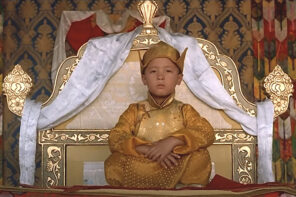When I first went to Taiwan to study Chinese, I never thought that I would be speaking fluent Mandarin one day. But these days I often find myself conversing with students from China and Taiwan and sometimes, quite against my wishes, overhear intricate details of Chinese lovers’ talk.
Last week, when the Dalai Lama was in Minneapolis, I had a chance to go to a conference attended by nearly 150 Chinese students. Luckily, I ended up being privy to a fascinating meeting. I sat at the back of the slightly-overheated and jam-packed conference hall of a hotel in downtown Minneapolis, and the Dalai Lama engaged with the students on topics ranging from Mao to Marxism to China-Tibet relations.
The Dalai Lama’s good humor and his frequent use of Chinese words (Chinese political slogans, communist party titles, names of legendary leaders) sent the students into sporadic fits of giggles. Midway through the conversation, His Holiness, much to their surprise, told them “as far as socio-political beliefs are concerned, I consider myself a Marxist.” “But not a Leninist,” he clarified.
During the question and answer session, a student said that the Marxists these days criticize consumerism because they do not understand the difference between “consumption” and “consumerism.” He also asked about the contradiction inherent in the Dalai Lama’s economic philosophy and Marx’s critique of religion. The Tibetan leader answered that the Marx was not against religion or religious philosophy per se but against religious institutions that were allied, during Marx’s time, with the European ruling class. He also provided an interesting anecdote about his experience with Mao. He said that Mao had felt that the Dalai Lama’s mind was very logical, implying that Buddhist education and training help sharpens the mind. He said he met with Mao several times, and that once, during a meeting in Beijing, the Chinese leader called him in and announced: “Your mind is scientific!”—an assessment that was followed by the famous line, ”religion is poison.”
But the interesting paradox here is that rather than religion being seen as a poison, it has become one of the most sought-after commodities in China.
At least two other panelists, both Chinese writers, agreed that all sorts of religious beliefs are flourishing in China, particularly Buddhism and Christianity, as the Chinese consume spirituality.
Now, Marxism, purported to be the guiding philosophy of the Chinese Community Party, has been replaced by American style capitalism in China. But the author of Das Kapital must be laughing in his grave for gaining new converts in the West, particularly in the academia, following the global financial crisis.
The dialogue between the Dalai Lama, frequently criticized by the Chinese government as a closet separatist, and the students, which lasted for nearly three hours, allowed the Tibetan leader to give Chinese students a very different impression than what they are used to hearing from their own government. I know that one day they will be leading China. (Twenty or thirty years ago US-educated Taiwanese students went back and ran their country. The Taiwanese Central Bank or the equivalent of Federal Reserve Board, for instance, was for decades run by economists trained at the University of Minnesota).
Basking in the inspirational afterglow of the meeting, students at the post-meeting reception chatted vigorously with their friends. “He has a very cute personality,” the 22-year-old philosophy undergraduate who asked the Tibetan leader about his Marxists beliefs offered.




